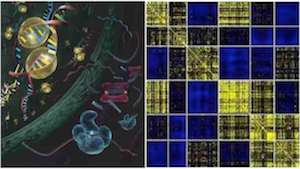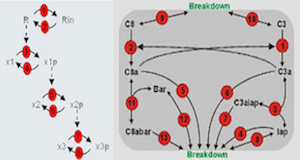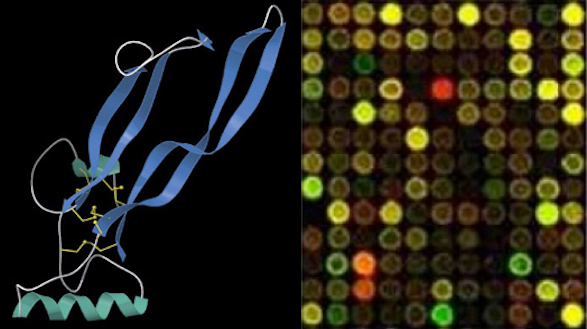RESEARCH
Cancer Genomics
 Millions of cells are dividing every minute in our human body. Normally, this process is well coordinated and cell divisions are followed by ordered patterning and cell specialization, allowing the maintenance of tissues and organs internal equilibrium (homeostasis). Cancer can be regarded as a deviation from this balanced behavior: a single cell, that has undergone mutations in its DNA, instead of maturing and dying normally reproduces without restraint. This is usually accomplished by incessant rather than faster dividing and it gives rise to a progeny that usually fails to mature. In this perspective it is clear that cancer is a very complex disease, involving not only cancerous cells, but also surrounding and distant normal cells, which engage an infinite number of complex interactions. Thus the effort of unraveling such a complexity by using genomic approaches is the focus of my laboratory.
Millions of cells are dividing every minute in our human body. Normally, this process is well coordinated and cell divisions are followed by ordered patterning and cell specialization, allowing the maintenance of tissues and organs internal equilibrium (homeostasis). Cancer can be regarded as a deviation from this balanced behavior: a single cell, that has undergone mutations in its DNA, instead of maturing and dying normally reproduces without restraint. This is usually accomplished by incessant rather than faster dividing and it gives rise to a progeny that usually fails to mature. In this perspective it is clear that cancer is a very complex disease, involving not only cancerous cells, but also surrounding and distant normal cells, which engage an infinite number of complex interactions. Thus the effort of unraveling such a complexity by using genomic approaches is the focus of my laboratory.
Decoding the Mammalian Transcriptome
 RNA is implicated in proteins biosynthesis as well as in several biological processes, which were not even imagined few years ago. RNA, indeed, is now recognized for its role in protein synthesis inhibition and for its contribution to genomic complexity: alternative transcription, splicing and translation and RNA editing allow single genes to encode for multiple proteins and a central role for non-coding RNA is beginning to emerge in cell signaling and regulation of gene expression. For these reasons my principal research interests and efforts are devoted to the understanding of transcriptome complexity, by coupling DNA sequences annotation and gene expression profiling, supported by robust statistics and computation.
RNA is implicated in proteins biosynthesis as well as in several biological processes, which were not even imagined few years ago. RNA, indeed, is now recognized for its role in protein synthesis inhibition and for its contribution to genomic complexity: alternative transcription, splicing and translation and RNA editing allow single genes to encode for multiple proteins and a central role for non-coding RNA is beginning to emerge in cell signaling and regulation of gene expression. For these reasons my principal research interests and efforts are devoted to the understanding of transcriptome complexity, by coupling DNA sequences annotation and gene expression profiling, supported by robust statistics and computation.
Systems Biology
 Systems biology studies living organisms in terms of underlying networks rather than simply focusing on individual molecular components. A "system" can be anything from a gene regulatory network to a cell, a tissue, or an entire organism. This research focuses on systems composed of many molecular components, describing them, and trying to understand their underlying dynamics. Systems Biology, for instance, studies how genes and proteins interact, how fluxes distribute in a metabolic pathway, or how a given system reacts to external perturbations. High-throughput, quantitative technologies are essential for this type of research, and they must be supported by suitable mathematical and statistical models, and by robust computation.
Systems biology studies living organisms in terms of underlying networks rather than simply focusing on individual molecular components. A "system" can be anything from a gene regulatory network to a cell, a tissue, or an entire organism. This research focuses on systems composed of many molecular components, describing them, and trying to understand their underlying dynamics. Systems Biology, for instance, studies how genes and proteins interact, how fluxes distribute in a metabolic pathway, or how a given system reacts to external perturbations. High-throughput, quantitative technologies are essential for this type of research, and they must be supported by suitable mathematical and statistical models, and by robust computation.
Bioinformatics and Computational Biology
 Bioinformatics can be regarded as the field of intersection between biology and computer science. It uses the power of computation to store, analyze, integrate, and visualize complex biological data to answer biological questions. This field is concerned with organizing biomolecular databases, managing the quality of data input, getting useful information out of such databases, and integrating information from disparate sources. Genomics, systems biology, and high-throughput biological research are based on such sophisticated computer-based tools and advances in these fields would not have been impossible without the parallel development of Bioinformatics.
Bioinformatics can be regarded as the field of intersection between biology and computer science. It uses the power of computation to store, analyze, integrate, and visualize complex biological data to answer biological questions. This field is concerned with organizing biomolecular databases, managing the quality of data input, getting useful information out of such databases, and integrating information from disparate sources. Genomics, systems biology, and high-throughput biological research are based on such sophisticated computer-based tools and advances in these fields would not have been impossible without the parallel development of Bioinformatics.
